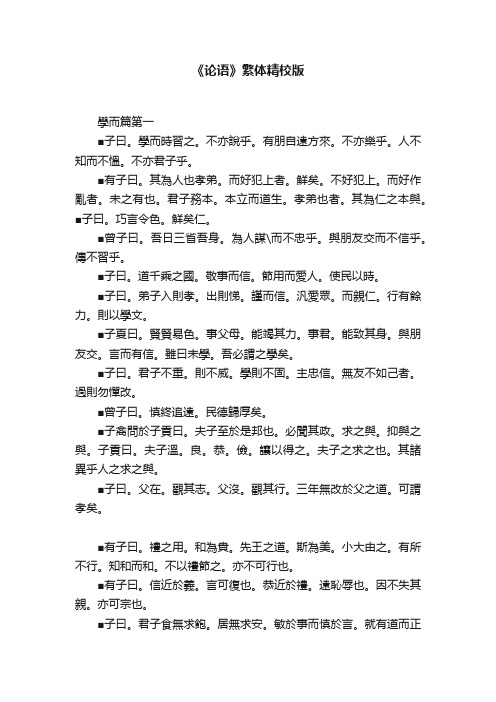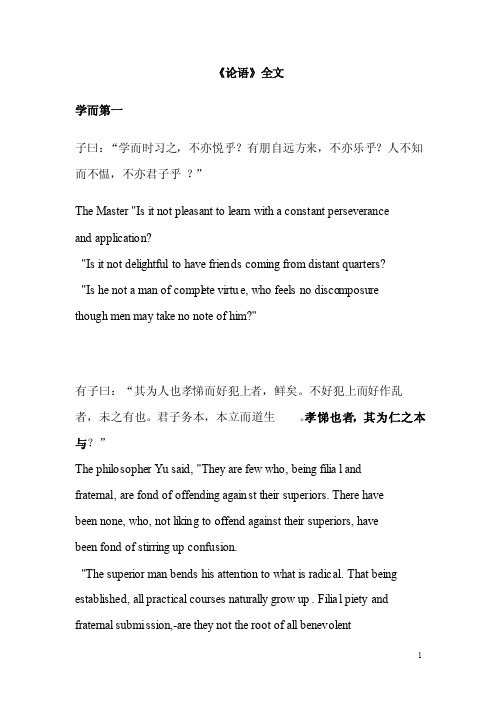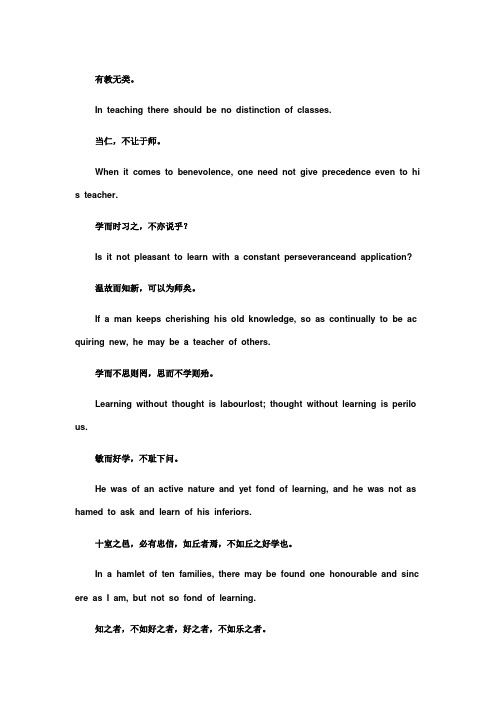论语(繁简体、英文对照),学而第一
《论语》繁体精校版

《论语》繁体精校版學而篇第一■子曰。
學而時習之。
不亦說乎。
有朋自遠方來。
不亦樂乎。
人不知而不慍。
不亦君子乎。
■有子曰。
其為人也孝弟。
而好犯上者。
鮮矣。
不好犯上。
而好作亂者。
未之有也。
君子務本。
本立而道生。
孝弟也者。
其為仁之本與。
■子曰。
巧言令色。
鮮矣仁。
■曾子曰。
吾日三省吾身。
為人謀\而不忠乎。
與朋友交而不信乎。
傳不習乎。
■子曰。
道千乘之國。
敬事而信。
節用而愛人。
使民以時。
■子曰。
弟子入則孝。
出則悌。
謹而信。
汎愛眾。
而親仁。
行有餘力。
則以學文。
■子夏曰。
賢賢易色。
事父母。
能竭其力。
事君。
能致其身。
與朋友交。
言而有信。
雖曰未學。
吾必謂之學矣。
■子曰。
君子不重。
則不威。
學則不固。
主忠信。
無友不如己者。
過則勿憚改。
■曾子曰。
慎終追遠。
民德歸厚矣。
■子禽問於子貢曰。
夫子至於是邦也。
必聞其政。
求之與。
抑與之與。
子貢曰。
夫子溫。
良。
恭。
儉。
讓以得之。
夫子之求之也。
其諸異乎人之求之與。
■子曰。
父在。
觀其志。
父沒。
觀其行。
三年無改於父之道。
可謂孝矣。
■有子曰。
禮之用。
和為貴。
先王之道。
斯為美。
小大由之。
有所不行。
知和而和。
不以禮節之。
亦不可行也。
■有子曰。
信近於義。
言可復也。
恭近於禮。
遠恥辱也。
因不失其親。
亦可宗也。
■子曰。
君子食無求飽。
居無求安。
敏於事而慎於言。
就有道而正焉。
可謂好學也已。
■子貢曰。
貧而無諂。
富而無驕。
何如。
子曰。
可也。
未若貧而樂。
富而好禮者也。
子貢曰。
詩雲。
如切如磋。
如琢如磨。
其斯之謂與。
子曰。
賜也。
始可與言詩已矣。
告諸往而知來者。
■子曰。
不患人之不己知。
患不知人也。
為政篇第二■子曰。
為政以德。
譬如北辰,居其所而眾星共之。
■子曰。
詩三百。
一言以蔽之。
曰。
思無邪。
■子曰。
道之以政。
齊之以刑。
民免而無恥。
道之以德。
齊之以禮。
有恥且格。
■子曰。
吾十有五而志於學。
三十而立。
四十而不惑。
五十而知天命。
六十而耳順。
七十而從心所欲。
不逾矩。
■孟懿子問孝。
子曰。
無違。
樊遲禦。
子告之曰。
孟孫問孝於我。
我對曰。
《论语》中英文对照版

论语 CONFUCIAN ANALECTS学而第一『⒈1』子曰:“学而时习之,不亦说乎?有朋自远方来,不亦乐乎?人不知而不愠,不亦君子乎?”The Master said: "Is it not pleasant to learn with a constant perseverance and application? "Is it not delightful to have friends coming from distant quarters? "Is he not a man of complete virtue, who feels no discomposure though men may take no note of him?"『⒈2』有子曰:“其为人也孝弟,而好犯上者,鲜矣;不好犯上,而好作乱者,未之有也。
君子务本,本立而道生。
孝弟也者,其为仁之本与!”The philosopher Yu said, "They are few who, being filial and fraternal, are fond of offending against their superiors. There have been none, who, not liking to offend against their superiors, have been fond of stirring up confusion. "The superior man bends his attention to what is radical. That being established, all practical courses naturally grow up. Filial piety and fraternal submission,-are they not the root of all benevolent actions?"『⒈3』子曰:“巧言令色,鲜矣仁!”The Master said, "Fine words and an insinuating appearance are seldom associated with true virtue."『⒈4』曾子曰:“吾日三省吾身——为人谋而不忠乎?于朋友交而不信乎?传不习乎?”The philosopher Tsang said, "I daily examine myself on three points:-whether, in transacting business for others, I may have been not faithful;-whether, in intercourse with friends, I may have been not sincere;-whether I may have not mastered and practiced the instructions of my teacher."『⒈5』子曰:“道千乘之国,敬事而信,节用而爱人,使民以时。
论语二十篇全(繁体版)

論語二十篇全(繁體版)學而篇第一1.1子曰:“學而時習之,不亦說乎?有朋自遠方來,不亦樂乎?人不知而不慍,不亦君子乎?”1.2有子曰:“其為人也孝弟,而好犯上者,鮮矣;不好犯上而好作亂者,未之有也。
君子務本,本立而道生。
孝弟也者,其為仁之本與!”1.3子曰:“巧言令色,鮮矣仁!”1.4曾子曰:“吾日三省吾身:為人謀而不忠乎?與朋友交而不信乎?傳不習乎?”1.5子曰:“道千乘之國,敬事而信,節用而愛人,使民以時。
”1.6子曰:“弟子入則孝,出則弟,謹而信,泛愛眾,而親仁,行有余力,則以學文。
”1.7子夏曰:“賢賢易色;事父母,能竭其力;事君,能致其身;與朋友交,言而有信。
雖曰未學,吾必謂之學矣。
”1.8子曰:“君子不重則不威,學則不固。
主忠信,無友不如己者,過,則勿憚改。
”1.9曾子曰:“慎終追遠,民德歸厚矣。
”1.10子禽問於子貢曰:“夫子至於是邦也,必聞其政,求之與,抑與之與?”子貢曰:“夫子溫、良、恭、儉、讓以得之。
夫子之求之也,其諸異乎人之求之與?”1.11子曰:“父在,觀其誌;父沒,觀其行;三年無改於父之道,可謂孝矣。
”1.12有子曰:“禮之用,和為貴。
先王之道,斯為美。
小大由之。
有所不行。
知和而和,不以禮節之,亦不可行也。
”1.13有子曰:“信近於義,言可復也。
恭近於禮,遠恥辱也。
因不失其親,亦可宗也。
”1.14子曰:“君子食無求飽,居無求安,敏於事而慎於言,就有道而正焉。
可謂好學也已。
”1.15子貢曰:“貧而無諂,富而無驕,何如?”子曰:“可也。
未若貧而樂,富而好禮者也。
”子貢曰:“《詩》雲:‘如切如磋,如琢如磨’,其斯之謂與?”子曰:“賜也,始可與言《詩》已矣,告諸往而知來者。
”1.16子曰:“不患人之不己知,患不知人也。
”為政篇第二2.1子曰:“為政以德,譬如北辰,居其所而眾星共之。
”2.2子曰:“《詩》三百,壹言以蔽之,曰:‘思無邪’。
”2.3子曰:“道之以政,齊之以刑,民免而無恥。
《论语》全文中英对照

《论语》全文学而第一子曰:“学而时习之,不亦悦乎?有朋自远方来,不亦乐乎?人不知而不愠,不亦君子乎?”The Master "Is it not pleasa nt to learnwith a consta nt persev eranc eand applic ation?"Is it not deligh tfulto have friend s coming from distan t quarte rs?"Is he not a man of comple te virtue, who feelsno discom posur ethough men may take no note of him?"有子曰:“其为人也孝悌而好犯上者,鲜矣。
不好犯上而好作乱者,未之有也。
君子务本,本立而道生。
孝悌也者,其为仁之本与?”The philos opher Yu said, "They are few who, beingfilial andfrater nal, are fond of offend ing agains t theirsuperi ors. Therehavebeen none, who, not liking to offend agains t theirsuperi ors, havebeen fond of stirri ng up confus ion."The superi or man bendshis attent ion to what is radica l. That beingestabl ished, all practi cal course s natura lly grow up. Filial pietyandfrater nal submis sion,-are they not the root of all benevo lentaction s?"子曰:“巧言令色,鲜矣仁。
中英文对照版《论语》

中英文对照版《论语》性相近也,习相远也。
By nature,men are nearly alike;by practice, they get to be wide apart.过而不改,是谓过矣.Not to mend the fault one has made is to err indeed.己所不欲,勿施于人。
What you do not want done to yourself,do not do to others。
言必信,行必果。
Keep what you say and carry out what you do。
君子以文会友,以友辅仁。
The superior man on grounds of culture meets with his friends,and by their friendsh ip helps his virtue.三军可夺师也,匹夫不可夺志也。
The commander of the forces of a large State may be carried off, but the will of even a common man cannot be taken from him。
后生可畏,焉知来者之不如今也?A youth is to be regarded with respect。
How do you know that his future wi ll not be equal to our present?有朋自远方来,不亦乐乎?Is it not delightful to have friends coming from distant quarters?人不知而不愠,不亦君子乎?Is he not a man of complete virtue,who feels no discomposure though men may take no note of him?父在,观其志。
中英文对照版《论语》

中英文对照版《论语》性相近也,习相远也。
By nature,men are nearly alike; by practice,they get to be wide apart。
过而不改,是谓过矣.Not to mend the fault one has made is to err indeed。
己所不欲,勿施于人。
What you do not want done to yourself, do not do to others。
言必信,行必果。
Keep what you say and carry out what you do.君子以文会友,以友辅仁。
The superior man on grounds of culture meets with his friends, and by their friendsh ip helps his virtue。
三军可夺师也,匹夫不可夺志也。
The commander of the forces of a large State may be carried off,but the wi ll of even a common man cannot be taken from him。
后生可畏,焉知来者之不如今也?A youth is to be regarded with respect. How do you know that his future will not be equal to our present?有朋自远方来,不亦乐乎? Is it not delightful to have friends coming from distant quarters?人不知而不愠,不亦君子乎?Is he not a man of complete virtue, who feels no discomposure though men may t ake no note of him?父在,观其志。
论语-学而篇一中英文对照

论语学而篇第一1、子曰:“学而时习之,不亦说乎?有朋自远方来,不亦乐乎?人不知而不愠,不亦君子乎?”The master said: is it not a pleasure, having learned something, to try it out at due intervals? Is it not a joy to have likeminded friends come from afar? Is it not gentlemanly not to take offence when others fail to appreciate your abilities?”2、有子曰:“其为人也孝弟,而好犯上者,鲜矣;不好犯上,而好作乱者,未之有也。
君子务本,本立而道生。
孝弟也者,其为仁之本与!”You zi said, “it is rare for a man whose character is such that he is good as a son and obedient as a young man to have the inclination to transgress against his superiors; it is unheard of for one who has no such inclination to be inclines to start a rebellion. The gentleman devotes his efforts to the roots, for one the roots are established, the way will grow therefrom, being good as a son and obedient as a young man is, perhaps the root of a man’s character.”3、子曰:“巧言令色。
孔子语录《论语》中英文对照

有教无类。
In teaching there should be no distinction of classes.当仁,不让于师。
When it comes to benevolence, one need not give precedence even to hi s teacher.学而时习之,不亦说乎?Is it not pleasant to learn with a constant perseveranceand application?温故而知新,可以为师矣。
If a man keeps cherishing his old knowledge, so as continually to be ac quiring new, he may be a teacher of others.学而不思则罔,思而不学则殆。
Learning without thought is labourlost; thought without learning is perilo us.敏而好学,不耻下问。
He was of an active nature and yet fond of learning, and he was not as hamed to ask and learn of his inferiors.十室之邑,必有忠信,如丘者焉,不如丘之好学也。
In a hamlet of ten families, there may be found one honourable and sinc ere as I am, but not so fond of learning.知之者,不如好之者,好之者,不如乐之者。
They who know the truth are not equal to those who love it, and they w ho love it are not equal to those who delight in it.默而识之,学而不厌,诲人不倦,何有于我哉。
- 1、下载文档前请自行甄别文档内容的完整性,平台不提供额外的编辑、内容补充、找答案等附加服务。
- 2、"仅部分预览"的文档,不可在线预览部分如存在完整性等问题,可反馈申请退款(可完整预览的文档不适用该条件!)。
- 3、如文档侵犯您的权益,请联系客服反馈,我们会尽快为您处理(人工客服工作时间:9:00-18:30)。
論語论语CONFUCIAN ANALECTS.學而第一学而第一BOOK I. HSIO R.【第一章】【一节】子曰、學而時習之、不亦說乎。
【二节】有朋自遠方來、不亦樂乎。
【三节】人不知而不慍、不亦君子乎。
【第一章】【一节】子曰、学而时习之、不亦说乎。
【二节】有朋自远方来、不亦乐乎。
【三节】人不知而不愠、不亦君子乎。
CHAPTER I. 1. The Master said, 'Is it not pleasant to learn with a constant perseverance and application? 2. 'Is it not delightful to have friends coming from distant quarters?' 3. 'Is he not a man of complete virtue, who feels no discomposure though men may take no note of him?'【第二章】【一节】有子曰、其為人也孝弟、而好犯上者鮮矣、不好犯上、而好作亂者、未之有也。
【二节】君子務本、本立、而道生、孝弟也者、其為仁之本與。
【第二章】【一节】有子曰、其为人也孝弟、而好犯上者鲜矣、不好犯上、而好作乱者、未之有也。
【二节】君子务本、本立、而道生、孝弟也者、其为仁之本与。
CHAP. II. 1. The philosopher Yu said, 'They are few who, being filial and fraternal, are fond of offending against their superiors. There have been none, who, not liking to offend against their superiors, have been fond of stirring up confusion. 2. 'The superior man bends his attention to what is radical. That being established, all practical courses naturally grow up. Filial piety and fraternal submission!-- are they not the root of all benevolent actions?'【第三章】子曰、巧言令色、鮮矣仁。
【第三章】子曰、巧言令色、鲜矣仁。
CHAP. III. The Master said, 'Fine words and an insinuating appearance are seldom associated withtrue virtue.'【第四章】曾子曰、吾日三省吾身、為人謀、而不忠乎、與朋友交、而不信乎、傳不習乎。
【第四章】曾子曰、吾日三省吾身、为人谋、而不忠乎、与朋友交、而不信乎、传不习乎。
CHAP. IV. The philosopher Tsang said, 'I daily examine myself on three points:-- whether, in transacting business for others, I may have been not faithful;-- whether, in intercourse with friends, I may have been not sincere;-- whether I may have not mastered and practised the instructions of my teacher.'【第五章】子曰、道千乘之國、敬事而信、节用而愛人、使民以時。
【第五章】子曰、道千乘之国、敬事而信、节用而爱人、使民以时。
CHAP. V. The Master said, To rule a country of a thousand chariots, there must be reverent attention to business, and sincerity; economy in expenditure, and love for men; and the employment of the people at the proper seasons.'【第六章】子曰、弟子、入則孝、出則弟、謹而信、凡愛眾、而親仁、行有餘力、則以學文。
【第六章】子曰、弟子、入则孝、出则弟、谨而信、凡爱众、而亲仁、行有余力、则以学文。
CHAP. VI. The Master said, 'A youth, when at home, should be filial, and, abroad, respectful to his elders. He should be earnest and truthful. He should overflow in love to all, and cultivate the friendship of the good. When he has time and opportunity, after the performance of these things, he should employ them in polite studies.'【第七章】子夏曰、賢賢易色、事父母、能竭其力、事君、能致其身、與朋友交、言而有信、雖曰未學、吾必謂之學矣。
【第七章】子夏曰、贤贤易色、事父母、能竭其力、事君、能致其身、与朋友交、言而有信、虽曰未学、吾必谓之学矣。
CHAP. VII. Tsze-hsia said, 'If a man withdraws his mind from the love of beauty, and applies it as sincerely to the love of the virtuous; if, in serving his parents, he can exert his utmost strength; if, in serving his prince, he can devote his life; if, in his intercourse with his friends, his words are sincere:-- although men say that he has not learned, I will certainly say that he has.'【第八章】【一节】子曰、君子不重、則不威、學則不固。
【二节】主忠信。
【三节】無友不如己者。
【四节】過則勿憚改。
【第八章】【一节】子曰、君子不重、则不威、学则不固。
【二节】主忠信。
【三节】无友不如己者。
【四节】过则勿惮改。
CHAP. VIII. 1. The Master said, 'If the scholar be not grave, he will not call forth any veneration, and his learning will not be solid. 2. 'Hold faithfulness and sincerity as first principles. 3. 'Have no friends not equal to yourself. 4. 'When you have faults, do not fear to abandon them.'【第九章】曾子曰、慎終追遠、民德歸厚矣。
【第九章】曾子曰、慎终追远、民德归厚矣。
CHAP. IX. The philosopher Tsang said, 'Let there be a careful attention to perform the funeral rites to parents, and let them be followed when long gone with the ceremonies of sacrifice;-- then the virtue of the people will resume its proper excellence.'【第十章】【一节】子禽問於子貢曰、夫子至於是邦也、必聞其政、求之與、抑與之與。
【二节】子貢曰、夫子溫﹑良﹑恭﹑儉﹑讓、以得之、夫子之求之也、其諸異乎人之求之與。
【第十章】【一节】子禽问于子贡曰、夫子至于是邦也、必闻其政、求之与、抑与之与。
【二节】子贡曰、夫子温﹑良﹑恭﹑俭﹑让、以得之、夫子之求之也、其诸异乎人之求之与。
CHAP. X. 1. Tsze-ch'in asked Tsze-kung, saying, 'When our master comes to any country, he does not fail to learn all about its government. Does he ask his information? or is it given to him?' 2. Tsze-kung said, 'Our master is benign, upright, courteous, temperate, and complaisant, and thus he gets his information. The master's mode of asking information!-- is it not different from that of other men?'【十一章】子曰、父在、觀其志、父沒、觀其行、三年無改於父之道、可謂孝矣。
【十一章】子曰、父在、观其志、父没、观其行、三年无改于父之道、可谓孝矣。
CHAP. XI. The Master said, 'While a man's father is alive, look at the bent of his will; when his father is dead, look at his conduct. If for three years he does not alter from the way of his father, he may be called filial.'【十二章】【一节】有子曰、禮之用、和為貴、先王之道、斯為美;小大由之。
